“To me these highway expansions represent an old way of doing business.”
— Juan Carlos González, Metro Council
The climate crisis is here and it is real; but leadership from elected officials to connect this reality to transportation decisions is mostly still a dream. A Metro Council meeting Tuesday was another opportunity for ostensibly progressive politicians to stop the status quo of freeway expansions in our region.
Unfortunately only one out of six councilors present for the vote took a stand.
The six councilors debated the merits of three amendments to the Metropolitan Transportation Improvement Program (MTIP) that would allow major projects to move forward into construction phases. Two of those projects — which include adding lanes to sections of Highway 217 and Interstate 205 — would increase driving capacity and climate change-inducing greenhouse gas emissions. (The fact that a vote and discussion occurred on these resolutions at all last night is likely only because anti-freeway activists pressured Metro to remove them from the consent agenda of a previous meeting. Metro claims the schedule change was due to staff being away on vacation.)
While activists saw the resolutions as another do-or-die moment in the fight against the 40% of Oregon’s GHG emissions that come from transportation, the Metro staffer who introduced them framed them as mere procedural moves.
“The I-205 project is already in the MTIP for its preliminary engineering and right-of-way phases,” explained Metro Transportation Planning Manager Ted Leybold, “This amendment would add approximately $375 million to… be able to build the project.” And for the Highway 217 project, Leybold assured Metro Council members that the resolution was “basically an administrative cleanup” and they were voting to amend, “the exact same project that was previously approved.”
Advertisement
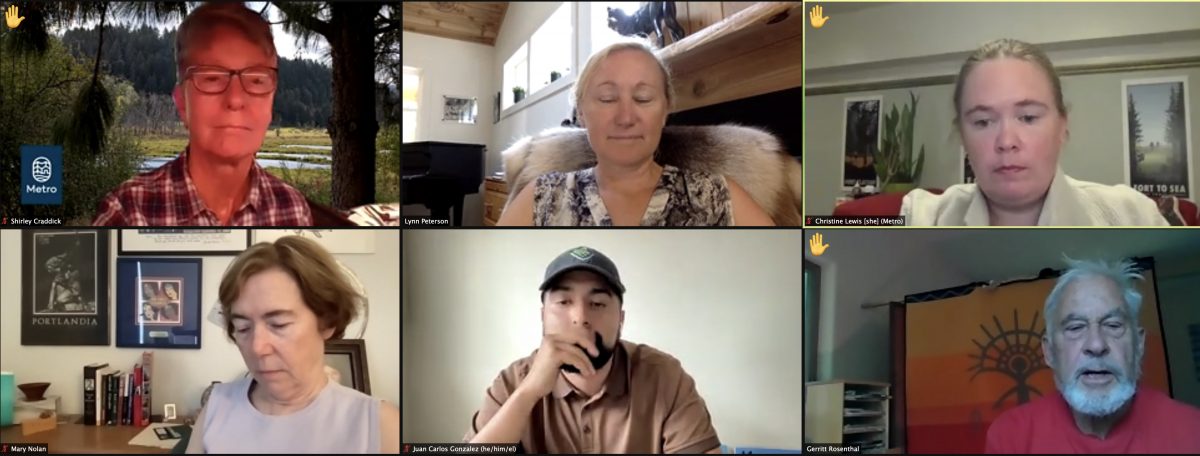
In public testimony prior to the votes, Metro Council heard from the Mayor of West Linn and the CEO of the North Clackamas Chamber of Commerce about why these projects were important for, “… enabling and ensuring efficient movement of people and freight to support our economy,” and the need for seismic retrofits on the I-205 Abernethy Bridge.
We have to stop digging the hole deeper. We’re in a crisis, it’s time to break the glass.”
— Chris Smith, No More Freeways
Chris Smith, a former Metro Council Candidate, former member of the Portland Planning and Sustsainability Commission and founding member of the nonprofit No More Freeways — who recently called Metro’s Regional Transportation Plan a “suicide pact” because of how it puts a top priority on highway expansion designs — struck a much different tone. Smith said he values long-range planning and understands the need for regional consensus on major transportation investments. “But it is not adequate to meet this moment,” Smith said. “Just over a month ago we had almost 100 people in this region die in a climate-linked heatwave. Nowhere does that eventuality appear in our regional plans to have 116 degree temperatures.”
Smith then pointed out how Metro’s various climate strategies are not aggressive enough. “We have to be prepared to tear up some of our plans and revise our thinking,” he implored. “I think you have two choices here: You can do what you typically do, which is cast the vote that supports the regional process, the consensus, but that will lead to unacceptable outcomes. We have to stop digging the hole deeper. Your other choice is to use a really ugly process and vote against this and have to re-think some things, but that will lead to better outcomes. I am inviting you to do that.”
“We’re in a crisis, it’s time to break the glass,” Smith concluded.
Economist and fellow freeway fighter Joe Cortright then proceeded to caution Metro about the Oregon Department of Transportation’s misleading promises on greenhouse gas emissions. “ODOT has two sets of books,” Cortright said, referring to his 11 pages of written testimony. “I’ve documented from ODOT’s own data that they are planning through the rest of this decade, to look for climate-destroying emissions from transportation to increase… I want to suggest that you cannot rely on the word of the Oregon Department of Transportation… this agency can’t be trusted… it’s presenting to you, claims about the environmental performance of its projects that simply aren’t borne out. It’s planning to burn lots more gasoline, create lots more climate pollution, and the only way to stop that is to be by stop giving them the permission to widen freeways and increase traffic.”
Metro District 4 Councilor Juan Carlos González, who represents northern and western Washington County, spoke first when it was time to vote. He said he’s aware of how much support and process the projects have behind them. “However, I question these projects, given the information that we have now regarding our need to act or climate future and prioritize communities that have been deprived of infrastructure investments,” González said. Then he picked up an issue he’s long pushed for: The lack of investment in Tualatin-Valley Highway despite its terrible safety record. “To me these highway expansions represent an old way of doing business, where community infrastructure like our orphan highways are presented with an argument of scarcity and mega-highways are met with substantial investment.”
Advertisement
González said he planned to vote no on both freeway project resolutions. Then he went one step further. “From here on out [I] will no longer support any fossil fuel highway infrastructure projects, unless ODOT and the state legislature prioritize heavily investing in or region’s orphan highways and key community arterials like TV-Highway, Farmington Road, Powell Boulevard, Pacific Highway (99), McLoughlin Boulevard, 82nd Avenue, Barbur Boulevard, etc, at the level that they merit, and when we are able to center these massive infrastructure investments around restorative, and environmental justice.”
After stirring public testimony and González’s surprising remarks, the other five councilors (Bob Stacey was not present) all voted yes on the resolutions.
Councilor Shirley Craddick said she wants Metro to do more to reduce greenhouse gas emissions on a variety of fronts, but would still vote yes on the resolutions because, “I don’t see today’s vote as having a significant impact on reducing our greenhouse gas emissions.”
Metro Council President Lynn Peterson acknowledged that “We need to to business differently.” But then she also voted yes. Peterson explained that supporting more lanes and wider freeways, “Really is a balance at the local level, providing access to local trip-making as well as access of longer distance trips through the region.” Peterson lamented the failure of the Metro funding measure that would have invested heavily in transit and the orphan highways Councilor González spoke of. Peterson also pointed to how many of the major projects in the region are transit projects (the Division Transit Project also moved forward at the meeting) and that the future will be weighted more heavily toward bus rapid transit.
“I will be voting yes,” Peterson continued, “Because I think we are making progress going forward. And do we need to make more? Heck yeah! But that means that we’re going to have to re-think the Regional Transportation Plan and re-think how we actually fund transportation in the state. Two big heavy lifts.”
Councilor Mary Nolan (who beat out Chris Smith for her seat in 2020), said Joe Cortright’s testimony about ODOT’s “discontinuity” of information-sharing (between what they tell Metro council and what they tell bond holders) was a “wake-up call”. She also threw her full support behind the comments of Councilor González. “Having said that,” Nolan continued. “I nonetheless will be voting in favor of this project… Not because I fully endorse the project, but because it’s my understanding… this project is part of a package negotiated in good faith around the region. I don’t like the project and wouldn’t have designed it the way it is now. But the other part of this bargain has been delivered. And I think with regret, I need to support following through and demonstrate Metro’s good faith when I’m going to be demanding ODOT’s good faith.”
Councilor Christine Lewis, who represents the southern part of the region, also shared reluctance to her yes vote. She said the extra lanes on I-205 near Oregon City are necessary to reduce cut-through traffic on surface streets and that she’s pushing ODOT to allow buses to use the shoulder so more people will take transit. “This is a solution that is not an elegant solution,” Lewis said, “But it is the solution that is right here squarely in front of us we are ready to go.”
District 3 Councilor Gerritt Rosenthal said he considers the I-205 and Highway 217 projects to be, “technological infrastructure improvements rather than capacity enhancements.” In explaining his yes vote, Rosenthal said he thinks the projects correct issues like earthquake risk and “suicide merges”. “You don’t want to leave it a three or four mile stretch of odd-sized lanes in an urban area,” he said. Rosenthal also threw support behind Councilor González’s comments. “I support the conceptual objections of a counselor González, but I think that too much planning, and too many needs are there.”
— Jonathan Maus: (503) 706-8804, @jonathan_maus on Twitter and jonathan@bikeportland.org
— Get our headlines delivered to your inbox.
— Support this independent community media outlet with a one-time contribution or monthly subscription.




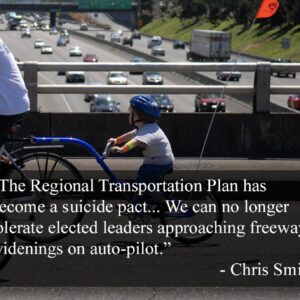
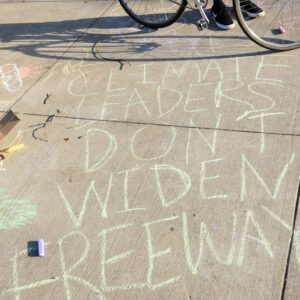
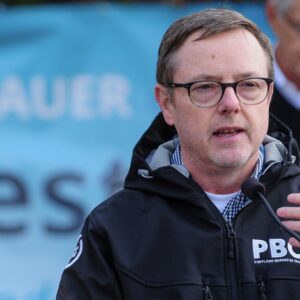
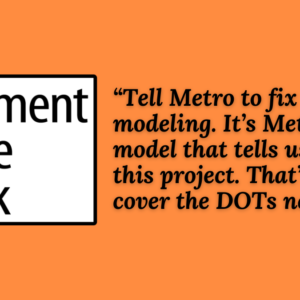
Thanks for reading.
BikePortland has served this community with independent community journalism since 2005. We rely on subscriptions from readers like you to survive. Your financial support is vital in keeping this valuable resource alive and well.
Please subscribe today to strengthen and expand our work.
It’s so disappointing to see freeway expansion projects go through. Hope someone quotes this “technological infrastructure improvements rather than capacity enhancements.” to Councilor Rosenthal when the inevitable capacity enhancements follow this project.
“would increase driving capacity and climate change-inducing greenhouse gas emissions”
The vast majority of centrists (e.g. most democrats) view freeways as neutral infrastructure when it comes to the climate crisis largely because the UN IPCC scientific consensus views electrification of motorvehicles as the primary mitigation pathway for transportation-associated CO2e emissions. The fact that the market urbanist “No More Freeways” group seem to be incapable of understanding (or responding to) this point of view is a perfect example of “subculture” epistemic closure and likely one of the reasons their fight against “freeways” has largely failed to gain traction. (There are better arguments than a pure CO2e reduction argument for fighting freeway expansion, ATMO.)
PS: If “No More Freeways” genuinely wanted to reduce cage use via demand management they would not focus on freeways but focus on the approach used by just about every single example of successful urban “congestion/demand pricing”: charge fees and/or limit access to wealthy urban centers. Instead “No More Freeways” supports an approach designed to disproportionately target low-income people who have been displaced to the metro periphery. Their argument that any fees collected would eventually “trickle down” to poor folk, despite the abject failure of this kind of redistribution in Portland/OR, is simply not credible. I also view their lukewarm support of the “possibility” of progressive pricing as a cynical political tactic to maintain some level of support from the left (based on their previous willingness to support a “grand bargain” without progressive pricing.)
As a member of “No More Freeways” I object to the distortions and ad hominem assertions in the above post. Claiming that my opposition to freeway expansion is not genuine, and putting falsely quoted words in my mouth, such as “trickle down” and a ‘”grand bargain” without progressive pricing’ is offensive and utterly false. If you want to do something substantive to fight global warming, fine, do it and toot your horn about your good works, but attacking others who are working on other aspects of the problem hardly seems productive.
UN IPCC: “In model pathways with no or limited overshoot of 1.5°C, global net anthropogenic CO2 emissions decline by about 45% from 2010 levels by 2030.”
In other words, to prevent warming over 1.5°C, if Oregon is doing just it’s “share”, it should quickly decarbonize transport (and to do it’s “fair share”, it should decarbonize even faster).
But, simple question: is Oregon/ODOT currently on-track to decarbonise 45% or more of the on-road vehicle fleet electrified by 2030?
Simple answer: no. Even Washington, with one of the most advanced pieces of legislation on transport electrification, will not be hitting 100% EV sales until 2030. And even Oregon, which just passed one of the most advanced timelines for electricity decarbonization, will not hit 100% clean power until 2040, so only those EV drivers who opt-in to green power will be 100% cleanly operating, and that’s not even considering the emissions from making the cars/steel and freeways/concrete.
And are Oregonians currently – at less than 1.5 degrees of warming – being killed by climate change? Yes.
So, unless we want more people to die, more often, we need to reduce emissions faster. Even if IPCC has modeled a scenario where that’s done via electrification, I think I’ve shown above that a) this is currently unachievable by Oregon at the speed needed to stay under a 1.5°C increase, and b) even if it were achievable, we’d want to go faster because climate change is already causing enough harm and our response should be commensurate with that.
But again, from the IPCC:
> The 1.5°C pathways require an acceleration of the mitigation solutions already featured in 2°C-consistent pathways (e.g., more efficient vehicle technologies operating on lower-carbon fuels), as well as those having received lesser attention in most global transport decarbonization pathways up to now (e.g., mode-shifting and travel demand management).
From the same section in the report:
> Since there is no silver bullet for this deep decarbonization, every possible measure would be required to achieve this stringent emissions outcome. The contribution of various measures for the CO2 emission reduction from the reference scenario to the IEA-B2DS in 2050 can be decomposed to efficiency improvement (29%), biofuels (36%), electrification (15%), and avoid/shift (20%).
Citation: https://www.ipcc.ch/sr15 (intro & Chapter 2.4.3.3).
so according to this, I’d say actually no, the IPCC does not say Oregon should keep building freeways and just electrify transport. We need to electrify transport, but also decarbonize in other ways.
p.s. there countless examples of where NMF has supported congestion pricing, and +1 to Doug’s comments. I find your comment to be baseless, unconvincing, and unsubstantiated. Please do better.
The pathway to lowering carbon emissions is electrifying public transportation and conversion to clean fuels, not the widespread adoption of electric SOVs. Freeway widening will just further entrench our regional reliance on personal motor vehicles, which is a path to ruin, even if the SOV fleet is eventually electrified. The marginalized and displaced population can be served by improving the transit system (as cash the wealthy gentrifying population that has displaced them), and that can be done by utilizing the existing right of way. Any expansion of freeway capacity will be counterproductive.
Yes, Chris Smith brings up a major missed point that the traditional highway proponents have overlooked but they will champion soon enough given the new normal of summer heat domes: the need for our highways to be air-conditioned for safety (just like Alta Planning’s recommendations for air-conditioned bike lanes in Dubai back in the 2010s.)
Thank you for reporting on this important issue.
Shame on anyone who voted for Nolan over Smith. This is on you.
***Roberta. Your comment has been deleted. I won’t tolerate that level of direct, personal insults. Please try again. Thanks. – Jonathan***